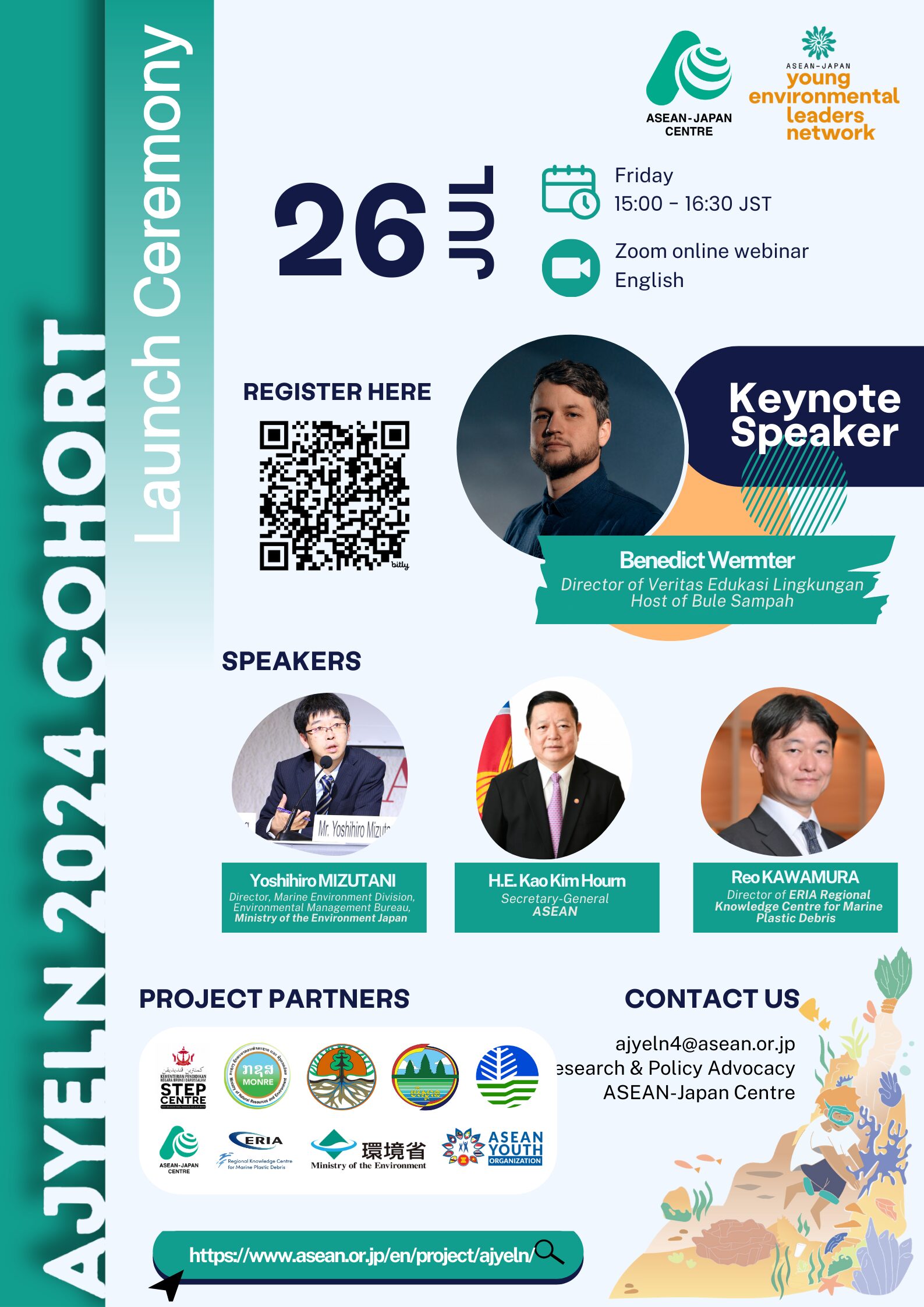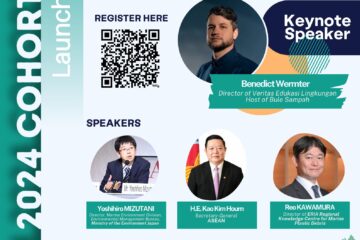Youtube link: https://www.youtube.com/live/OmpXSzBVp18?si=t-bmyNvgNCBX_5SW
The ASEAN-Japan Centre in partnership with the Regional Knowledge Centre for Marine Plastic Debris of ERIA and other partner-key stakeholders, launched the 2nd Cohort of the ASEAN-Japan Young Environmental Leaders Network (AJYELN) last July 26, 2024. The event gathered more than 150 online viewers from ASEAN countries and Japan.
Dr. Katrina Navallo, Programme Manager at the Research and Policy Advocacy Cluster of ASEAN-Japan Centre gave an introduction to the AJYELN Program. She shared that in 2024, there are 33 new AJYELN fellows from eight ASEAN countries and Japan.
The ceremony was graced by the welcome, inspirational, and congratulatory remarks of His Excellency Kao Kim Hourn, the Secretary General of the ASEAN Secretariat, Mr. Reo Kawamura, Director of ERIA Regional Knowledge Centre on Marine Plastic Debris, and Mr. Yoshihiro Mizutani, Director of the Marine Environment Division of the Environmental Management Bureau of the Japan Ministry of the Environment, respectively.
In his opening remarks, Director Kawamura emphasized the significance of raising awareness about marine plastic debris. He added the importance of youth-driven solutions to address this global crisis.
His Excellency Kao Kim Hourn delivered the welcome remarks, highlighting that the youth bring new perspectives and innovation. He further explained that their initiatives contribute significantly to the ASEAN region’s action plan on combating marine debris and the ASEAN sustainable consumption and production framework.
Mr. Mizutani conveyed his congratulatory message to the new fellows. He also shared the strategic partnership among ASEAN countries and Japan on the issue of marine plastic waste.
The keynote speech was delivered by Mr. Benedict Wermter, Director of Veritas Edukasi Lingkungan and Host of Bule Sampah, an Indonesian-based environmental education platform. He stated that their platform reaches 95% of Indonesians and the content is tailored specifically for the Indonesian audience. He emphasized the importance of tailoring projects to local communities, using simple language to communicate project goals, and engaging in both online and offline socialization to raise awareness and promote sustainable practices. Additionally, he discussed their foundation’s comprehensive environmental education program, which includes an app for waste training and micro-projects in coastal communities.
The AJYELN fellows from eight ASEAN countries and Japan showcased their project goals through a video presentation. Next, the fellows were asked questions related to their projects by two former AJYELN fellows from Malaysia (Ms. Lee Jia Xian) and Thailand (Ms. Intaphrom Poonyaporn), who implemented their projects last year. The highlights are as follows:
Brunei Fellows from Chung Hua Middle School Bunga Simpur Kaula Belait: “It is important to ensure that all our awareness campaigns reach a broad audience. [Using] a multi-faceted approach including several strategies to enhance the reach and impact of our visual campaigns”
Indonesia Fellows from SMA Taman Rama Jimbaran: “We included a special section for tourists…What we’re doing essentially is educating about plastic-free habits that they can do when they’re visiting.”
Japan fellows from Sapporo Keisei High School: “…we propose a solution that reduce some impact on the environment while maintaining or reducing plastics consumption by turning plastics made from oil into casein plastics.”
Malaysia fellows from MRSM Langkawi: “Our team has developed a comprehensive, multi-phase approach to project planning that ensures every aspect of our marine plastic pollution reduction event is meticulously organized”
Myanmar fellows from Hinthar Education: “[We] would say managing time and prioritizing tasks effectively are crucial for any projects, significantly our project SOS-Save Our Seas.”
Philippines fellows from Philippine Science High School Central Visayas Campus: “We want to be able to keep pushing through the difficulties of what could come our way. This serves as a reminder to ourselves that our project could reach so many people, even after AJYELN.”
Singapore fellows from Hwa Chong Institution: “By allowing youths to experience how marine plastic pollution can be transformed into something useful, youths would be more interested in marine plastic waste”
Thailand fellows from Wachirathamsatit School: “Working in teams will help us develop essential skills such as communication, cooperation, and conflict resolution. These are vital skills not just for this project, but for their future careers and personal lives.”
Viet Nam fellows from different schools: “…provide benefits to volunteers who participate in activities that keep the beach clean in order to attract more attention from people, especially the one who may be initially indifferent to the issue of marine plastic pollution.”
Dr. Chris Hirabayashi, Secretary-General of the ASEAN-Japan Centre concluded the launching ceremony through a closing remarks, highlighting that he was impressed with the fellows’ presentations. Moreover, he shared his admiration and thanks to all stakeholders who made the launch possible.



